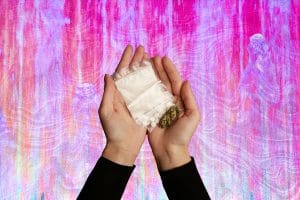When you think of Salt Lake City, Utah, home of The Church of Jesus Christ of Latter-Day Saints (a.k.a. the Mormon Church), a burgeoning community of psychonauts probably isn’t the first thing to come to mind.
But this past may, about 120 (mostly) ex-Mormons, attended the virtual Mormon Psychedelic Summit, hosted by the Salt Lake City-based psilocybin church The Divine Assembly, where panelists presented on topics like, “How Psychedelics Help Reprogram Unhealthy Thoughts and Beliefs” (Christine Stenquist, Dr. Rachel Allen, Dr. Scott Allen), “Shedding the Patriarchy” (Courteny Clark Kendrick, Andrew Jolley, Steve Urquhart), “Embracing the Divine Feminine” (Brooke Lark and Trish Damon), “Earth-based Wisdom and Sacred Sexuality” (Kait Singley, Jake Wheadon), “Safety and Sincerity in Recognizing and Healing from Religious Trauma” (Ane Oxford and Carly Oster), and “Dropping Fundamentalist Dogma to Nurture Connection” (Tami Harris, Kole Witty, and Jason Olsen).
To call it the Mormon Psychedelic Summit, however, seems a bit of a stretch; whereas “Ex-Mormon Psychedelic Summit” might be more apt. And although it was billed as a summit, where the sharing of information, workshops, and research is par for the course, the event, to me felt like an LDS Fast and Testimony Meeting, where faithful members of the Church of Jesus Christ of Latter-Day Saints are invited to speak extemporaneously about their faith to an audience of fellow congregants.
Read: This Former Latter-day Saint Politician Started a Psilocybin Church—But Is it Legal?
Through the now-omnipresent Zoom rectangles, panelists shared their tales—occasionally through tears—about how psychedelics helped them reprogram unhealthy thoughts, claim their womanhood, shed the patriarchy, and heal the trauma that some may have experienced from dogmatic or oppressive styles of religious practice (note that this phenomenon isn’t specific only to the LDS Church, but occurs in a variety of faiths, among those who may deviate from the religious practice they grew up with).
Like most religions, the Church is seeing an exodus of its Gen Z and Millennial members, many of whom see religious practice as stale and outdated. Psychologist John Dehlin, Ph.D. a former Mormon who was excommunicated for his outspoken support of the LGBTQ community and female ordination, and the founder of the long-running Mormon Stories podcast, believes that leaving the LDS faith can be traumatic in and of itself.
For him, there’s no mystery as to why many LDS who leave the faith are attracted to psychedelics: “If you’re a post-Mormon, you’re probably alienated from your family and siblings. And family alienation is one of the most severe forms of trauma. Most people who leave Mormonism are highly rejected by their parents, grandparents, and children. That’s trauma. Many of the Mormons flocking to psychedelics are trying to heal their trauma. Not only the traumas of Mormonism, but the traumas of leaving.”
How to Grow Shrooms Bundle
Take Both of Our Courses and Save $90!
In my experience growing up Mormon, I found the LDS faith to be a demanding religion, and the requirements to be a member in good standing are rigorous and include strict behavioral codes and rules on diet, dress, tithing, sexual practices, and marriage. There are also extensive demands on resources and time commitment, and an emphasis on the infallibility of leadership.
Beyond these tenets, the beating, bleeding heart of the LDS faith is the family. It is taught that if one faithfully obeys the rules and goes through the motions of baptism, receiving the Holy Ghost, and marriage in an LDS Temple, then salvation—or eternal life with your family and close proximity to God—can be obtained. To leave the faith then, is to destroy the unity of your family for eternity.
Kelly McCann, MA, LMFT is a marriage & family therapist based in Southern California. Deeply familiar with Mormon culture, she grew up in Utah as a member of the LDS faith and now works with a broad range of clients, many of whom are incorporating psychedelics into their post-Mormon lives.
Like Dehlin, McCann (who did not attend the summit) has observed trauma in the Mormon psychedelic community, and a longing among many to break free of their Momon upbringing. “People want to unbuild; I think that’s why people go to psychedelics,” she said. “When they’re able to be in their bodies and feel rather than dreaming of perfection and striving for some ethereal afterlife, they’re like, ‘Oh my God, Heaven is now.’ That’s such a revelation to them because we’ve been conditioned to be uncomfortable with our bodies, and spontaneity, and all the rich and yummy things in life.”
One attendee at the summit, Jason Coleman, didn’t attend with processing trauma in mind, but wanted to connect with like-minded ex-Mormons. A former LDS missionary, he hails from Utah and is a direct descendent of LDS Prophet Ezra Taft Benson. Coleman says that psychedelics, ketamine, and cannabis saved his life after a diagnosis of bipolar disorder, divorce, and severe anxiety and depression.
“There is a void that a lot of us are trying to fill, and that void is community. I think from a young age we’re kind of raised to integrate our personal life with our spiritual life, so when the Church doesn’t fulfill that for you anymore, you seek it on your own,” Coleman said. “It feels like a community where we can have these [psychedelic] experiences together and come at them from a common starting point.”
Read: Why Humans Believe In God
Many other attendees I spoke to consumed psychedelics for many other reasons, as well: to feel at one with God, to genuinely connect to their bodies, to heal the wounds of patriarchy, to experience sex unattached to the obligations of marriage and procreation, and to finally feel like they are enough, even if at times they felt on account of their relationship to Mormonism that they were unworthy or broken.
“In these post-Mormon psychedelic experiences, you’re meeting the Divine,” said Dehlin. “The psychedelic post-Mormon rotates around the axis that you are inherently worthy and inherently good enough. Whether you meet your inner child or some type of god [during a psychedelic journey], that thing is telling you, You are worthy and good enough as you are.’”
The Divine Assembly Founder Steve Urquhart says he had hoped that by hosting the Mormon Psychedelic Summit, the conversations following local psychedelic ceremonies would shift away from shedding Mormonism and more toward integrating new experiences.
But for McCann, the continued conversations around Mormonism make perfect sense. “Of course the Mormons are organizing around drugs now! These are distinct characteristics of Mormons, they love to organize. We need to act out our process in front of one another. They’re learning how to be a healthy adult post high-demand religion.”

DoubleBlind is a trusted resource for news, evidence-based education, and reporting on psychedelics. We work with leading medical professionals, scientific researchers, journalists, mycologists, indigenous stewards, and cultural pioneers. Read about our editorial policy and fact-checking process here.

DoubleBlind Magazine does not encourage or condone any illegal activities, including but not limited to the use of illegal substances. We do not provide mental health, clinical, or medical services. We are not a substitute for medical, psychological, or psychiatric diagnosis, treatment, or advice. If you are in a crisis or if you or any other person may be in danger or experiencing a mental health emergency, immediately call 911 or your local emergency resources. If you are considering suicide, please call 988 to connect with the National Suicide Prevention Lifeline.



